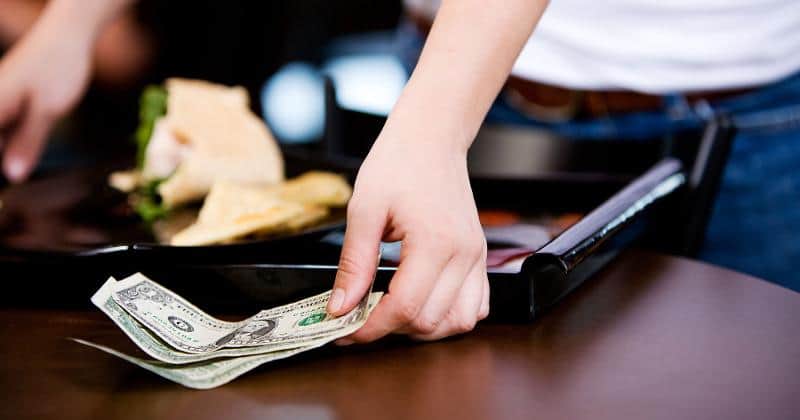Can a Restaurant Owner Keep Tips?

Hi. I’m Jack Bastide. If you’re wondering Can a Restaurant Owner Keep Tips you’re in the right place. In this article we will cover this question as well as many other important questions about tip sharing etiquette at restaurants.
By law a restaurant owner can not keep the servers’ tips. Servers are often paid less than minimum wage and make most of the money in tips. Tipping compensates underpaid workers for great service. Sometimes non tipped employees will share in a portion of the tips with a tip jar or tip pooling.
How Are Tips Split in a Restaurant?
It all depends. Sometimes each server will just keep their own tips. Other times it will be split. There are several ways to split tips in a restaurant.
Traditional Tip Jar: Whatever tips are earned during a shift are placed in the tip jar and then divided equitably. With this one, just be wary of sticky fingers; some unscrupulous personnel may take advantage. And even customers have been known to run off with proceeds from the tip jar.
Splitting Tip Income By The Hour: All tips (cash and credit) are combined into one pot and the total is calculated. The tip pool sum is split by the number of hours worked for the day. This figure is known as the “hourly tip wage.” Each server is tipped based on the number of hours worked that shift multiplied by the “hourly wage” for that day.
How Does Tip Pooling Work?
Tip pooling occurs when some or all of the night’s tip money is collected and split amongst all servers — rather than each server keeping the tips they earned separately.
Tip pooling can help guarantee that workers are adequately reimbursed for their labor. But, it can be a source of discontent for servers who have spent the entire night juggling multiple tables and see others not working as hard.
Are Tips Taxed Differently Than Wages?
In a nutshell no, but it depends on if the tips are from a W-2 job or a 1099 independent contractor position. If you are a W2 employee you will be taxed on your tips the same as your server salary.
Are Tips Taxable?
Tips, especially monetary tips, are taxable. If your tips amount to $20 or more, you must report them monthly to your employer. Fill out IRS Form 4070. Report the tips from the previous month to your employer by the 10th of the current month.
All cash and non-monetary tips received by an employee are considered income and must be reported to the IRS. All cash tips received by an employee during a calendar month are subject to social security and Medicare taxes and must be disclosed to the employer.
If the employee earned less than $20 in total tips from a single employer within a single calendar month, the employee is not required to file a tip credit claim these tips do not need to be reported and no taxes must be withheld.
Tips collected from clients, charged tips (e.g., credit and debit card charges) delivered to the employee by the employee’s employer, and tips received from other employees under any tip-sharing agreement are all examples of cash tips. Tips received by both directly and indirectly tipped employees are also included.
Do Chefs Receive Tips?
Usually not, but depends upon the restaurant.
Here are two examples of different restaurants: At one, servers are supposed to tip the busses 2%, the Salad Chef who also prepares beer/wine/desserts 1%, and the dishwasher 0.5 percent (don’t even get me started on waiters who disregard tip out “suggestions” and pocket 100% of their gratuities).
At the second restaurant, 3% goes to the busser, 2% to the runner, 1% to the bartender, and 0.5 percent to the host. However, in my hospitality experience, gratuities for chefs are quite infrequent. Cooks should be paid more so that they don’t have to rely on tips.
How Much Do Waiters Make in Tips a Day?
That’s like asking “How long is a piece of string?
It all depends. There are numerous variables. How busy is the restaurant? How big are your tables, how generous (or not) are your customers? Did you provide immaculate service or barely service your tables? What is the average ticket size?
Big cities are likely to pay more than small towns. Then there’s the extremely personal belief system that each person possesses. Some people are completely opposed to tipping and will not tip under any circumstances. Your customers may be servers themselves and understand how the system works, so tip well.
Which shift do you work? Friday and Saturday nights are prime shifts (meaning good tips), although this can vary. Slow changes frequently indicate small pockets.
What kind of restaurant do you work in? Is it a posh, fine-dining institution or a greasy spoon truck stop? There are fine dining establishments, truckstops, draft houses, and Waffle Houses.
Is Automatic Gratuity Legal?
While the IRS mandates all gratuity reporting, which means that every restaurant in the United States is forced to follow those standards, state legislation can still impact how automatic gratuity is implemented at the state level.
Automatic gratuity is permissible on a federal level, but how it is reported on taxes varies by state. California, for example, has its own rule governing how service charges are taxed.
Still, it is substantially the same as the federal laws (the California law came first, actually). So far, California is the only state with a separate, albeit comparable, service charge statute. If you’re considering introducing one, it’s best to be safe than sorry and check your state legislation first.
What is The Difference Between Tip Pooling and Tip Sharing?
What exactly is tip pooling?
Tip pooling occurs when tips are dispersed evenly among the participants in the pool. This assures that everyone receives an equal percentage of tips independent of external considerations like foot traffic, party size, or overall number of guests served, and fosters a sense of teamwork.
Tip pooling is a method of evenly distributing tips among team members. For example, having a pool of bartenders so one can take orders and another can mix drinks the entire time OR having all of the servers in the dining area pool tips together.
What exactly is tip sharing?
Tip sharing is also known as “tipping out.”
Unlike tip pooling, tip sharing involves sending a portion of tips to support workers. Tip sharing is taking a portion of a tip earner’s tips and distributing them to someone who supported them. For example, all waiters tip the chefs 3% of their meal sales, whereas bartenders send 20% of their gratuities to the barback.
Tipping out happens when servers donate a percentage of their tip revenue to non-waitstaff front-of-house employees. Tip pooling, on the other hand, refers to people in the same position pooling their tips and getting an equal amount from the pot. During tipping out, waiters keep most of the tips they earn directly, but when tip pooling, their tip amounts can vary greatly depending on their peers’ earnings.
Why are Tipped Employees Paid Less?
Because servers receive tips regularly, the government authorizes the employer to pay less than the minimum wage set by the dept of labor. This is known as the tip credit provision and applies to tipped workers.
Under federal minimum wage legislation, workers who get tips for their labor may be paid as little as $2.13 in actual pay. Salaries this low, however, are only permissible if a worker’s tips plus their wages equal the minimum wage rate of $7.25 per hour (or another rate in states with different minimum wage laws).
Should Kitchen Staff Get Tips?
Usually not. they should be paid enough so that they don’t have to rely on tips. In some cases the servers will tip out to line cooks and dishwashers but this is not very common. It all depends on the policy of the restaurant. Tips are frequently given to ancillary helpers (bussers, bartenders, etc.) but not to cooking employees.
What Percentage of Tips Do Food Runners Get?
Food runners do not get directly tipped by the customer. Instead they are tipped out by the servers they are working with. Percentage can vary based on the restaurant’s labor policy but it is usually 5 – 10% of the servers tips. A successful server will always “take care of” those who contributed to his/her full service to the customer. This can include food runners, bussers, bartenders and even cooks and dishwashers in certain cases.
Conclusion – Can a Restaurant Owner Keep Tips?
A restaurant owner should not keep tips under any circumstances. Tips should go to the servers and their support staff. Tips can be kept by each individual server or pooled and shared amongst tipped employees. In many cases servers will share their tips with support staff such as food runners, bussers and bartenders.
Jack Bastide is a Restaurant Consultant focusing on Restaurant POS technology. Make sure to check out our world famous restaurant resources page for a comprehensive offering of hand picked resources and tools to help your business. You can also check out some of our other restaurant business articles.



